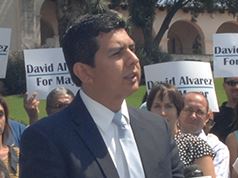
Democrats who support former Assemblymember Nathan Fletcher put the case against Councilmember David Alvarez succinctly: “He can’t win.” Often sandwiched between such phrases as “He’s a great guy” and “I have nothing against him,” the message is clear: If you don’t want Mayor Kevin Faulconer, you need to vote for Fletcher.
Why?
“It’s too soon for him to run.” San Diegans want a thicker resume than three years on City Council. Further, that’s not enough time to build the experience to take on a seasoned hand like Faulconer in debates.
“He started too late.” Alvarez didn’t throw his hat in until Interim Mayor Todd Gloria, Assembly Majority Leader Toni Atkins, and former Councilmember Donna Frye passed. While he wasn’t far behind fellow Councilmember Faulconer in declaring, he left Fletcher two weeks to solidify support.
“He’s too liberal.” Alvarez represents one of San Diego’s more liberal districts, where the needs of his constituents often run contrary to business interests, such as in the Barrio Logan Community Plan. While he’s not a bomb thrower, he’s had little reason to woo the business interests and more moderate voters that he would need to win in the general.
Didn’t former Mayor Filner beat former Councilmember DeMaio in 2012 while antagonizing those very interests? Yes. Which points out three salient points in the electoral math that appear to go against Alvarez: 2013 isn’t 2012, Alvarez isn’t Filner and Faulconer isn’t DeMaio.
2012 was is some ways a perfect storm for a liberal electorate. President Obama was at the top of the ticket, Gov. Brown was driving Democratic turnout for Proposition 30, and labor was determined to defeat Proposition 32. If Filner had to face the smaller, more conservative electorate expected for the 2013 off-year special election, we might have Mayor DeMaio.
Filner’s long career also gave him connections is less traditionally Democratic groups. His leadership on veteran’s issues was particularly helpful, and according to opensecrets.org, he doled out more than $8 million in earmarks in FY 2010 that probably helped with the business community. He also cleared the Democratic field, something Alvarez could not do despite the party endorsement. Competitors for progressive votes include not just Fletcher, but former City Attorney Mike Aguirre.
Filner also collected moderate support from people voting less for him than against DeMaio. While Faulconer may not generate the enthusiasm DeMaio did, he is less likely to drive voters to Alvarez. In the general, moderate and decline-to-state voters will be looking for a message and record that speaks to them, not just a “not-DeMaio” oval.
To make it to the general (and win it), Alvarez will need numbers similar to what Filner drew in 2012. Due to the dynamics of the special election, there will likely be fewer progressive votes to distribute among more candidates. That, his lower name recognition and his late start, makes Alvarez’s path to victory much rockier that it was for Filner just last year.












I can’t get enthusiastic over a Fletcher versus Faulconer race. Better to have a real progressive instead of Fletcher.